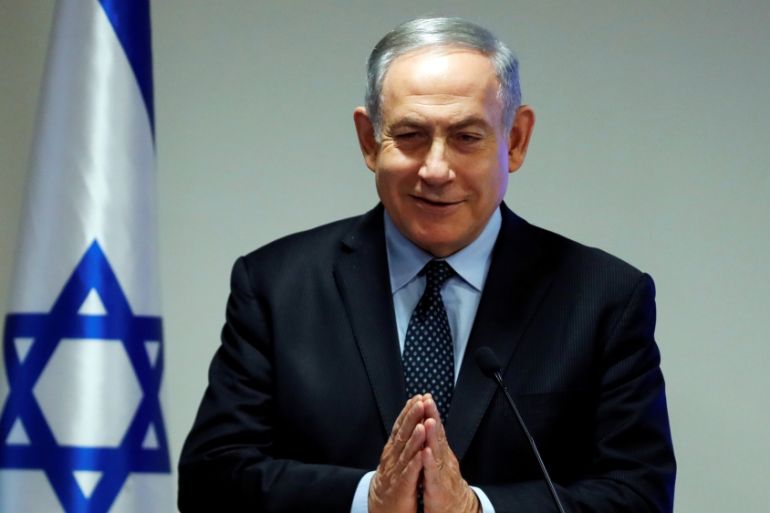Benjamin Netanyahu short of majority after Israel’s election
PM’s right-wing camp holds 58 seats, three shy of 61 needed to form government, with more than 99 percent votes counted.

Israel’s Prime Minister Benjamin Netanyahu has fallen short of capturing the majority needed to form a government, near-final election results showed on Wednesday, deepening a year of political deadlock in the country.
In an angry tirade on Wednesday, the long-serving leader conceded he did not have the parliamentary support to form a new government right away.
Keep reading
list of 3 itemsFor Palestinians, Netanyahu, Gantz are ‘two sides of same coin’
US and Israel vote: Two ‘racist’ incumbents and two proud Jews
But he still tried to claim victory as he lashed out at his main opponent and disparaged the leading Arab party – the third-largest in Parliament – as irrelevant.
“This is what the nation decided,” he said. “The public gave me more votes than any other candidate for prime minister in the nation’s history.”
After failing to form a government following two general elections last year and with his legal woes closing in, Netanyahu had been hoping for a clear win in Monday’s vote.
With initial exit polls predicting a near majority for Netanyahu and his nationalist-religious allies, he declared a “great victory” to thousands of jubilant supporters under a torrent of confetti on election night.
But Wednesday’s near-final tally painted a different picture.
With over 99 percent of the votes counted, Netanyahu’s Likud led the way with 36 seats, ahead of challenger Benny Gantz’s Blue and White party, with 33 seats.
Yet with his allies, Netanyahu’s right-wing camp held a total of only 58 seats, three shy of the 61 needed to form a government and no clear path to reaching the threshold.
The Joint List, an umbrella group of Arab-led parties, finished third with 15 seats, an all-time high for Palestinian-majority electoral alliance.
Final results are expected later on Wednesday.
Political paralysis
In a meeting with his political allies on Wednesday, Netanyahu continued to portray himself as a winner, despite the likely impasse he faces.
“The Likud under my leadership became the largest party in a knockout,” he said. “The public’s decision must be respected.”
|
|
He did not respond to a reporter’s question about lacking a parliamentary majority. But he again lashed out at the Joint List, saying it should not even be considered in the calculations for forming a new government.
While the Arab parties have never sat in an Israeli coalition, they have worked to support policies from the outside, a step they could take again if they can resolve their differences with Gantz.
Gantz also has ruled out a partnership with the Joint List, making it unlikely he can cobble together a coalition either. That means Israel appears headed for deadlock, extending nearly a year of political paralysis.
Netanyahu had been desperate for a strong showing in advance of his trial on corruption charges, scheduled to start on March 17.
Netanyahu was indicted last year on fraud, bribery and breach of trust charges in three separate corruption cases. He denies wrongdoing, saying the charges have been trumped up by a liberal media and a justice system looking to depose him.
Power-sharing deal
Israel’s president will soon begin consultations with the elected parties, which then recommend to him their preferred selection to lead the government.
Typically, the candidate with the most recommendations is asked to try to form a government. As leader of the largest party, that is likely to be Netanyahu, even if as in the previous two elections his path is unclear.
In a bid to break the deadlock, Likud and its allies have been trying to find ways to bridge the gap.
They have talked about luring “defectors” from opposition parties who could tick the right-wing bloc’s numbers up. But so far, no one has come forward, and a number of rumoured defectors have issued statements denying the speculation.
The most straightforward way out of the deadlock would be a power-sharing deal between Gantz and Netanyahu, whose parties together control a parliamentary majority. But Gantz has ruled out a partnership as long as Netanyahu heads Likud.
Netanyahu, on the other hand, insists on being prime minister of any unity government.
If neither candidate can form a government within the allotted time, Israel could face an unprecedented fourth-straight election.